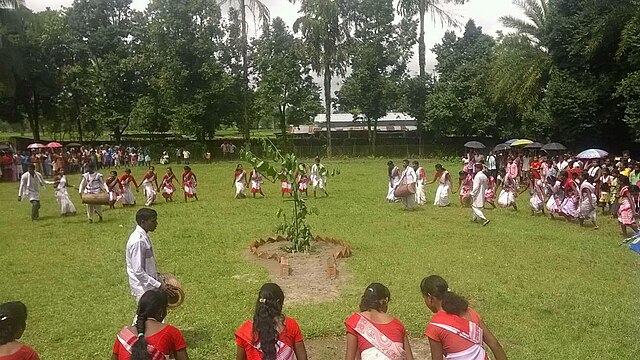The Tea-garden community is a term for a multiethnic, multicultural group of tea garden workers and their descendants in Assam. They are officially referred to as Tea-tribes by the government of Assam and notified as Other Backward Classes (OBC). They are the descendants of peoples from multiple tribal and caste groups brought by the British colonial planters as indentured labourers from the regions of present-day Jharkhand, Odisha, Chhattisgarh, West Bengal and Andhra Pradesh into colonial Assam during the 1860-90s in multiple phases to work in tea gardens. They are found mainly in those districts of Upper Assam and Northern Brahmaputra belt where there is a high concentration of tea gardens, like Kokrajhar, Udalguri, Sonitpur, Biswanath,Nagaon, Golaghat, Jorhat, Sivasagar, Charaideo, Dibrugarh, Tinsukia, and Lakhimpur. There is a sizeable population of the community in the Barak Valley region of Assam as well in the districts of Cachar, Karimganj and Hailakandi. The total population is estimated to be around 7 million, of which an estimated 4.5 million reside in residential quarters built inside 799 tea estates spread across tea-growing regions of Assam. Another 2.5 million reside in the nearby villages spread across those tea-growing regions. They speak multiple languages, including Sora, Odia, Assam Sadri, Sambalpuri, Kurmali, Santali, Kurukh, Kharia, Kui, Chhattisgarhi, Gondi and Mundari. Assam Sadri, distinguished from the Sadri language, serves as lingua franca among the community.

Tea Garden workers in a tea garden near Kalaigaon, Darrang district
Non-native languages of Assam, 2011 census
Sarnaism
Karam Festival in North Lakhimpur, Assam
Udalguri district (Pron:ˌʊdʌlˈgʊəri), also known as Odalguri, is a district in the Bodoland Territorial Region of the state of Assam in Northeastern India. Udalguri town is the headquarters of the district.
Paneri Tea Garden





